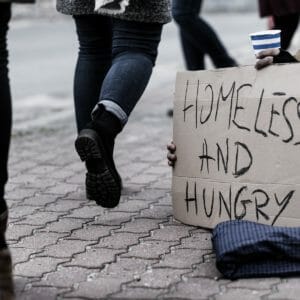This article was co-written by William Walker VI, a sophomore in the School of Sustainability and Paul Prosser, Project Partner Liaison at the School of Sustainability.
All students in Arizona State University’s Master of Sustainability Solutions (MSUS) program are required to design and execute a culminating experience project, with the goal being to partner with a community to confront a current sustainability issue. For their project, students Maryam Abdul Rashid, Skyliana Dosier, and Omar Sanchez are creating awareness about student homelessness, breaking down the corresponding stigmas, and improving access to services for homeless students in partnership with ASU’s Dean of Students office. The project explores the three fronts where homeless students experience the most insecurity: housing, health, and food.
Through their research, the team has defined “housing insecurity” as not having a stable or consistent place to stay while attending school. For example, housing insecure students may lodge in public spaces, crash on friend’s couches, or move from home to home. Housing insecurity has serious effects on a student’s well-being and performance. Some of the common challenges are physical trauma, emotional abuse, diminished mental well-being, feeling the need to quit school, substance addiction, and exposure to pollutantants. Desert heat in the valley is especially dangerous and even deadly for homeless populations. As additional stressors, homeless services are often difficult to find given the competing financial demands on limited university and city budgets. Community segregation policies aimed at pushing the homeless out and a lack of support services create inequitable learning environments for homeless students as compared to average students.
Due to the social stigmas based on stereotypes about homeless people, homeless students may be reluctant to ask for help or be classified as homeless. For those willing to ask for or look for help, it is difficult to know what resources are available as there is a lack of communication and a fragmentation of support services. There is no single directory or place to find and obtain comprehensive homeless services for food, housing, and health, either at ASU or any local city. This disconnect between providers and those in need creates a cycle of deepening need as students give up on finding resources, miss class, and compromise their well-being.
To resolve some of these issues, the group has proposed an ASU initiative named Sun Devils Together, a unified outreach program hosted by the Dean of Students office. Their efforts will focus on intervention points such as stigmas and stereotypes, resource accessibility, silo effects, as well as ASU student, faculty, and staff awareness. The idea is to increase resource accessibility by creating an online platform students can use to find housing options, financial support, mental health and wellness programs, food pantries, and other on-campus support.
The project’s first step in addressing student homelessness will be creating training materials to inform faculty and staff about the challenges homeless students face and building empathy in their approach. “Stigmas are the root cause of people going homeless… people need to relearn how to be empathetic,” says Skyliana Dosier.
To create more empathetic rhetoric around the issue, the students created a role-playing game to put faculty and staff in the shoes of a homeless student. The desired outcome is that faculty and staff will be more receptive to requests for help and will be more willing to guide and aid a student in need. The team’s hope is that the Dean of Students office will promote and distribute the homeless student assistant training materials and the role-playing game university-wide.
Although the student team will all be graduating in May, they want to see the project continue after their departure and beyond ASU’s boundaries. In addition to the role-playing game and training program, they would like to see stronger communication between non-profit service providers, government social service agencies, urban planners, city leaders, and universities.
The team envisions a co-op youth hostel on ASU’s campus based on the “housing first” approach for homelessness intervention. In the hostel, students would be able to live temporarily and will not forced into the emergency shelter system. Home might be where the heart is, but for some people, it is a bit more complicated. A home should be where you can consistently and fearlessly lay your head down at night, remain healthy, and always find a meal. With empathy, Sun Devils Together can foster a sustainable culture of care for homeless students by increasing equity, offering comprehensive services, and finding homes for students in need.
